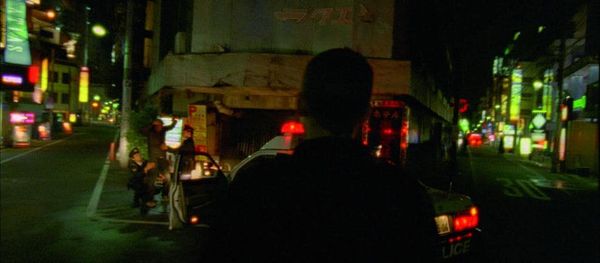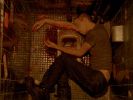Eye For Film >> Movies >> Enter The Void (2009) Film Review
Enter The Void
Reviewed by: Owen Van Spall

A hallucinatory wander through the muggy, neon-lit streets of modern Tokyo, maverick director Gaspar Noe's Enter The Void is visually and aurally arresting, and frustrating, in equal measure. The story is told out of sequence and from a complex and ambiguous set of perspectives throughout. We start from the first-person perspective of Oscar, (we are literally looking out from behind his eyes), who is eking out a living in red-light Tokyo as a small-time drug dealer following his parents' death years ago. Living with him is his free-spirited, party-loving sister Linda, with whom he has shared an intensely close (possibly incestuous) bond since childhood.
When Oscar is violently shot dead in a drug raid by police after being stung by a buyer, the camera becomes disconnected from his body and we follow it as it wanders, spirit-like ,through Tokyo's streets and walls and doors. It comes to rest on the various people in Oscar's present and past, taking us from sweaty encounters in Tokyo Love Hotels, back to the shocking accident that killed Oscar and Linda's parents. This journey is drenched in a multicoloured, foggy haze and set to a pulsing, droning soundtrack.

Are we viewing the perspective of Oscar's spirit? Is this the past or future, or some weird border between the real or netherworld? Is this ambiguous perspective a nod to the Tibetan Book Of The Dead that Oscar was reading before his death, the tome that explores one's experiences after death and before the next rebirth?
It should come as no surprise that Noe was inspired to craft this film as a result of, amongst other things, a hallucinogenic screening of Robert Montgomery's 1947 noir film Lady In The Lake, plus a healthy intake of Kenneth Anger and Stanley Kubrick.
It is certainly a film unlike anything else that will probably reach the UK this year in terms of its visual aesthetic. Noe is to be admired for the confidence with which he rejects conventional film making and narrative structure here, though the narrative itself, once reconstructed is somewhat slim. There are plenty of mind-bending, sickening and beautiful sequences to be enjoyed (or be repelled by) as the camera dips and weaves through a Tokyo that seems a blend of both real and reconstruction out of Noe's nightmare visions of the city. But many viewers will doubtless find the film exhausting (its European cut weighed in at over 160 minutes though this has been pared down for the UK), its pacing meandering, and its visual sequences gimmicky, unnecessarily explicit and crude than dazzling. This is a film that needs a both a strong stomach, and patience.
Reviewed on: 23 Sep 2010


















